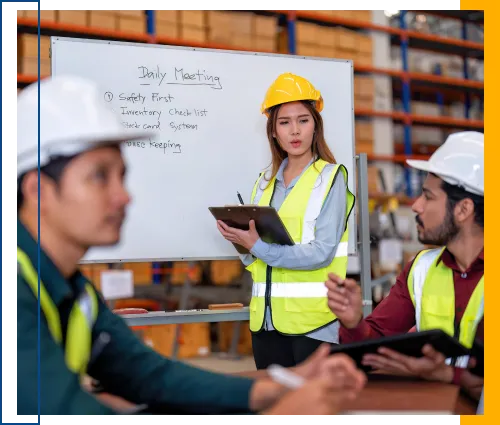Now Offering Spanish Safety Training!

Now Offering Spanish Safety Training!
General Safety
Hands-On Safety Projects for OSHA Compliance
FSDAVCFEBFEVSDDVFSD
FSDAVCFEBFEVSDDVFSD
FSDAVCFEBFEVSDDVFSD
General Safety - Hands-On Projects
Why Being Hands-On Matters in Safety Protocols

Hands-on safety projects offer employees practical training that reinforces safety protocols and compliance. These exercises simulate real-world scenarios, helping workers better understand safety requirements. Employees gain confidence in recognizing hazards, responding to emergencies, and implementing appropriate safety measures. Being hands-on not only improves safety awareness but also strengthens adherence to your protocols.
These projects are tailored to address industry-specific needs, covering critical safety aspects like equipment operation, emergency response, and hazard prevention. By actively engaging employees in safety exercises, organizations enhance knowledge retention, create a safer work environment, and ensure compliance with OSHA standards.

How Hands-On Safety Projects Enhance Training Experiences
Hands-on safety projects are highly effective in reinforcing safety skills. Being interactive provides employees with realistic scenarios. By practicing safety measures in a controlled environment, workers gain practical experience that prepares them for real-world challenges. This reduces accidents and ensures a stronger adherence to safety protocols.
Customizing projects to match industry needs is crucial. For instance, employees in manufacturing may engage in equipment handling exercises, while those in construction might focus on scaffolding safety. Tailoring projects in this way addresses unique risks faced in each sector. Integrating workplace safety training for Asheville, NC along with our hands-on methods can enhance preparedness, providing employees with skills most relevant to their roles.
Regularly incorporating hands-on safety projects helps maintain an ongoing commitment to safety. Employees become more engaged, as they can immediately see the impact of their training on workplace safety. This involvement fosters a proactive safety culture, encouraging workers to take ownership of compliance measures. The result is a safer, more aware workforce that is better equipped to prevent hazards and maintain OSHA compliance.
Implementing Hands-On Safety Projects from Nain LLC

Implementing hands-on safety projects effectively starts with a focused general safety analysis to pinpoint specific risks in the workplace. By identifying areas like hazardous material handling, confined spaces, or equipment safety, the training can be tailored to address these challenges directly. This targeted approach ensures that training sessions are not only relevant but also actionable, helping employees apply safety skills confidently in real situations.
Integrating documentation exercises into hands-on projects is equally important. Employees learn to document incidents accurately, maintain compliance logs, and update safety checklists regularly. This process not only familiarizes workers with documentation protocols but also reinforces the importance of record-keeping in maintaining OSHA compliance. Proper documentation aids inspections and supports continuous improvement, ensuring that safety measures are regularly reviewed and adjusted as needed.

Hands-on safety projects should be scheduled regularly to sustain high safety standards and keep employees engaged. Consistent training sessions help reinforce safety skills and ensure compliance with OSHA regulations. These sessions can be adapted based on employee feedback, focusing on areas where workers encounter the most challenges. For example, incorporating specialized forklift safety training can address specific hazards associated with heavy equipment. This adaptability makes hands-on training more effective, as it evolves with changing safety requirements, providing employees with updated skills.
Clear communication is essential during training sessions to maximize their effectiveness. Facilitators should deliver detailed instructions, allowing employees to understand safety protocols thoroughly. Real-time feedback is crucial for correcting mistakes quickly, reinforcing learning, and ensuring proper implementation of safety measures. This proactive training approach prepares employees to manage risks confidently, contributing to a safer work environment. By actively engaging workers, hands-on projects promote a safety-conscious culture that drives ongoing compliance and risk reduction.
Frequently Asked Questions
Frequently Asked Questions
What types of 'Hands On Projects' can Nain and Associates assist with?
Nain and Associates can assist with a wide range of safety-related projects. This includes creating Lockout-Tagout procedures, conducting evaluations for Confined Spaces, implementing new safety systems like 4-gas meter systems, managing forklift traffic control, setting up ergonomics programs, and more. Essentially, they can handle various projects tailored to enhance workplace safety.
How does Nain and Associates tailor these projects to my specific business needs?
Their experts work closely with you to understand the specific requirements and challenges of your workplace. They then creatively develop a plan that is not only compliant with safety regulations but also suits your unique business environment and operational needs.
What is the process for implementing a safety project with Nain and Associates?
The process generally starts with a consultation to assess your needs. Following this, Nain and Associates will develop a detailed plan for the project, including timelines and implementation strategies. They will then work alongside your team to ensure the project is executed efficiently and effectively, within the agreed timeframe.
Can Nain and Associates help with the implementation of technical safety systems, like gas detection or ergonomics programs?
Yes, they have expertise in implementing technical safety systems. Whether it's setting up a new gas detection system or developing an ergonomics program, their team can provide the necessary technical knowledge and support to ensure these systems are effectively integrated into your operations.
How does working on these projects with Nain and Associates benefit my company in the long run?
Collaborating with Nain and Associates for hands-on safety projects brings several long-term benefits. It ensures that your safety procedures are up-to-date and compliant with current regulations, reduces the risk of workplace accidents and injuries, enhances overall employee safety and wellbeing, and can improve operational efficiency. Their expertise also helps in fostering a proactive safety culture within your company.
Enhancing Safety with Real-World Training Projects
Real-world safety projects go beyond theoretical training by immersing employees in the scenario. These activities replicate potential workplace hazards that we've seen, allowing employees to practice responses in a controlled environment. Whether addressing fall prevention, chemical handling, or machinery safety, practical projects ensure employees understand how to handle risks effectively.
Adapting these projects to industry-specific requirements is vital. For instance, our specialized safety training services help businesses manage high-risk tasks like operating forklifts or handling hazardous materials. Tailoring training to these unique challenges helps build practical skills and improves safety outcomes across all work areas.
Regular evaluations of these training projects are crucial to ensure continuous safety improvement across the company. Gathering feedback from participants helps refine the training approach, making it more effective and relevant. Adjustments based on real employee experiences lead to a stronger safety culture and higher compliance rates.


Real-world training fosters a proactive safety mindset among employees by emphasizing skills and safety protocols. These projects not only teach hazard identification and response but also encourage employees to actively participate. Open communication during training helps workers feel comfortable voicing concerns and sharing ideas for improving safety measures. As employees become more engaged and confident in their ability to handle risks, their commitment to safety increases. This collaboration not only reduces incidents but also creates a stronger, more cohesive safety culture.
Building Long-Term Safety Through Practical Training
Implementing hands-on safety projects is an essential step toward fostering long-term safety and compliance. By actively engaging employees in realistic training, organizations can ensure that workers develop the necessary skills to manage workplace hazards effectively. Hands-on projects, such as emergency response drills and equipment handling exercises, allow employees to practice safety measures in a controlled setting, minimizing risks and increasing overall confidence. This immersive approach not only prepares employees for actual situations but also reinforces the importance of following safety protocols.
To maintain a consistent safety culture, organizations should regularly update and adapt their training projects to meet changing OSHA requirements and industry standards. Contact our workplace safety consultants in Hickory for ongoing safety programs that can help tailor these projects to address specific safety needs within your industry. This targeted approach not only ensures compliance but also keeps employees informed about the latest safety practices and regulations, promoting a proactive mindset toward safety management.
Effective hands-on safety projects also create a sense of ownership among employees. When workers participate actively in safety training, they develop a stronger commitment to maintaining a safe environment. This involvement encourages a culture of accountability, where employees take pride in their roles as safety advocates. As employees understand that their contributions directly impact workplace safety, engagement increases, leading to fewer incidents and improved compliance. This ongoing commitment to safety helps organizations maintain a safer, more productive work environment over the long term.
Have Questions About Our Services?
Contact us to learn more today!
Have Questions About Our Services?
Contact us to learn more today!





